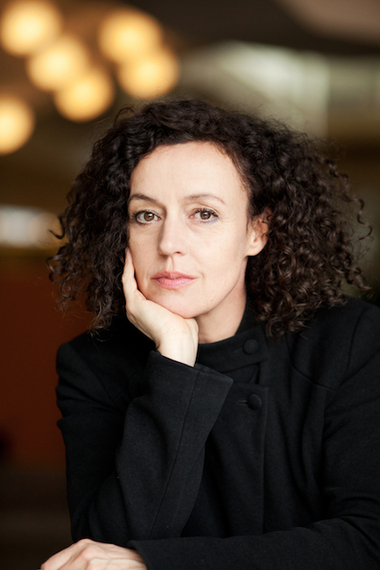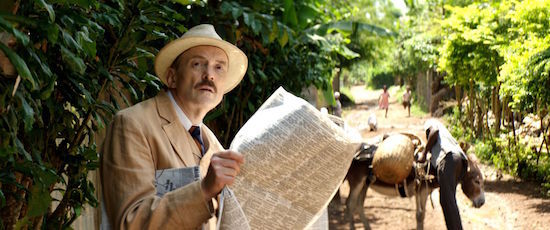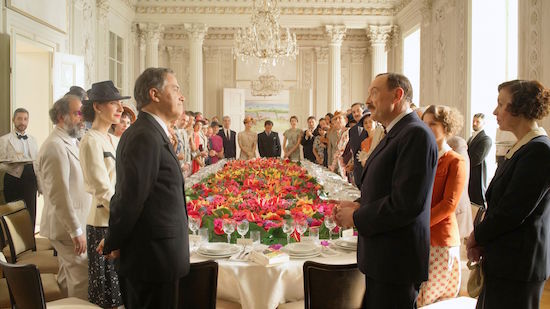It is a tragic fact that those who are the most moderate in this world are also the ones who are persecuted most violently. Pacifists like Martin Luther King Jr. and Mahatma Gandhi were murdered. Yitzhak Rabin and Malcolm X were killed once their views turned to peace between races. Jewish/Palestinian actor Juliano Mer-Khamis was assassinated for trying to promote a conversation between warring sides. Non-extremist bloggers are incarcerated and murdered throughout the Middle and Far East every day.
Even the disaster of our recent American presidential election can easily be blamed on the fact that a middle-ground, voice-of-reason candidate like Bernie Sanders was quieted swiftly and energetically by more militant politicians within his own party.
My own experience? Stand on the side of peace and understanding and the bullies will come after you. Guaranteed.
In this year's Austrian entry to the Foreign Language Oscars race, a masterpiece titled Stefan Zweig: Farewell to Europe, filmmaker Maria Schrader poetically exposes the life, loves, struggles, works and death of one of the most peaceful and moderate artistic voices of the 20th Century. Austrian Jewish writer Stefan Zweig himself fell victim to the extremist Nazi views of the mid-Thirties and in 1936 left his beloved country at the peak of his fame, never to return to Europe again.
Schrader, who also co-wrote and produced Stefan Zweig: Farewell to Europe, tells the writer's tale from the year of his departure until... Well, I usually don't want to give the ending of a film away, but this is public knowledge, so yes, until the day of Zweig's death. Schrader masterfully paints a picture of a temperate humanist, using scenes drawn from the photographs of the time, with the help of illustrious cinematographer Wolfgang Thaler (who filmed the 2016 Oscar-nominated Jordanian entry Theeb). She allows for the stillness of the camera, the colors of the frames and the nuances of her charismatic leading man Josef Hader to bring us, her audience along on a wondrous journey.
I'll admit when Schrader pointed out to me that it almost seemed I'd watched the film with three different sets of eyes, she touched on a truth. A part of me was moved to tears by the story of a man, a writer, a much-needed intellectual who left Austria at the same time as my own grandfather Hans left his home in Germany due to the same persecution, and whose destiny ran parallel to his in never seeing their homeland again. As a writer who believes deeply in a much needed peaceful conversation to resolve the chaos of the world, I also watched Stefan Zweig: Farewell to Europe with the hope things would turn out OK, which of course didn't happen in Zweig's case. Even if you are familiar with his story, the way Schrader tells it with such personal investment and infusing it with freshness, there is a haunting uncertainty that makes it feel almost like a thriller. Will Zweig, at least in this story, turn out to save the world after all with his calm, poetic, peaceful views? Will humanity make it to the 21st Century? And once they do, will they know how to handle democracy and freedom.
Finally, I watched Stefan Zweig: Farewell to Europe through the eyes of an audience member, the way we should all go to the movies -- and that's where the joy of watching such a beautifully made film comes in. Watching this exceptional figure, keeping me company in our own moments of political uncertainty, felt reassuring. Even if just for the fact that someone like Zweig existed during such a crucial time, and therefore can exist again. I dare to say Schrader's film should be recommended viewing for anyone kicking and screaming their way through democracy (on social media) these days.
I caught up with Maria Schrader via email, not my favorite vessel for getting to know someone. But through her answers, her own kind reminder of the beloved theater where my grandfather spent some of his most fruitful days in Berlin (which she discovered after taking the time to look him up!) and her no-nonsense description of herself -- you'll find that at the bottom of this piece -- I feel I know her. And I deeply like her, more than most people I've met in person.
Her interview is a connection I'll cherish, her film a gem to hold dear in my heart, for the long days ahead.
 It's a leitmotif I notice throughout history, the moderate and peace-seeking are those most often attacked. Stefan Zweig was no exception. Why do you think this is?
It's a leitmotif I notice throughout history, the moderate and peace-seeking are those most often attacked. Stefan Zweig was no exception. Why do you think this is?
Maria Schrader: The monstrosity of German fascism, maybe any kind of radicalism seem to demand opponents and critical voices who are no less radical. But how to put a humanistic and peace-seeking stand in equally loud words? You need a fine brush to paint a nuanced picture.
For a long time Stefan Zweig refused to condemn Hitler's Germany. He was accused of cowardice, but that accusation falls short. Behind Zweig's position there is a greater, more fundamental point of view. He describes a pacifist's concept when he declares: "I cannot attack. I will not write out of hatred. When my silence is a sign of weakness, I fear I must live with that stigma."
You've explained within the press kit your intellectual reasons for choosing to portray Zweig in your film, instead of other writers in a similar predicament before WWII. But I'm more interested in the emotional spark, what made you think, "I've got to make this film!" about him?
Schrader: There is something mysterious and unpredictable about those moments of decision, as if a door opens. We'd been researching for weeks before the first bits of the movie evoked in my phantasy. I was fascinated by the image of Stefan Zweig, this intellectual, European, urban and world famous figure standing in the midst of endless tropical vegetation, as beautiful as fierce. The difficulty of being torn between two worlds, the contradiction of having a paradise in front of his eyes and -- at the same time -- being permanently haunted by the ferocious pictures of what was going on in Europe, was a crucial part of his life in exile and is probably something every exile has to cope with. At the same time I was intrigued by the cinematic challenge of combining visible and invisible images. We all are able to share his brutal phantasies. I was intrigued by the idea of making a movie about the war, about Europe without being there, without actually filming it.
At one point, during his P.E.N. Congress interviews, Zweig says "politics is becoming the opposite of justice." Is that still true today?
Schrader: It depends on where to look at, who to listen to. I believed that we would have had the chance of positive change with Bernie Sanders as President. [Slavoj] Žižek recommends that Sanders should withdraw completely, remain silent until the loss of his voice becomes evident and powerful. Maybe he is right, maybe radicalism evokes stronger and 'more authentic' democratic powers. The question is what will we live through until then...
If Zweig lived today, what do you think would be his view of Europe at this point in time? And of the Middle East?
Schrader: That's a hypothetic question. Zweig is considered one of the masterminds of the European Union. He didn't want to survive Europe's catastrophic downfall and committed suicide. He believed in the peacemaking power of cultural exchange and variety. Of course he would be appalled by the fact that we who have experienced his utopia of a united and peaceful Europe are willing to abandon that achievement and are pulling up walls and fences again and close national borders. But I think he meets with Zizek praising the withdrawal, the pullback, and to only " invest hope in the big movements which sweep through the centuries."
How did you cast your leads? In particular the magnificent Josef Hader?
Schrader: Josef Hader is one of the most renowned Austrians nowadays. I was familiar with his work as a writer and comedian since a long time. I was always fascinated by his acting powers, his emotional depth, his sensitivity and intelligence, and I knew he would be at eye level with Zweig. I was thrilled to offer him something completely new in his career and I am grateful and stunned by his performance. Generally I consider myself very lucky to work with the finest casting directors and actors from so many different countries and to gather -- just in the sense of Zweig -- such a multinational, colorful and extraordinary cast of more than 80 actors and actresses. They are the beauty and richness of the movie.
And your cinematographer, Wolfgang Thaler, how did you decide to work with him?
Schrader: I wanted to create a sensual, immediate visual language which was, at the same time, elegant. Besides being one of the most acclaimed European cinematographers Wolfgang is most experienced with shooting in all parts of the world. We discovered the African Island Sâo Tomé, a virgin territory in terms of movies. Despite the fact that there was no infrastructure, no harbor, no stable electricity and just one flight a week he put all the effort into convincing the producers that this was the most enormous and enriching location for us. He is an adventurer, he makes the impossible possible and he is just a fine person.
Is there a lesson to be learned from Zweig, apart from his thinking and ideas? Do you think he offers a view into the current asylum seekers crisis? Are there "no islands left" today, as Joseph Brainin pointed out to Zweig during the P.E.N. Congress in Buenos Aires?
Schrader: We all were struck by the sudden actuality of the movie. We shot during the summer of 2015 when the current exodus started and so many refugees arrived in Europe. Now the dialogues in the movie, the 70 years-old historic quotes seem to echo the problems and headlines of our time. When Barbara Sukowa as Zweig's first wife tells him about the thousands of people trying to get onto ships in the harbor of Marseille, we are inevitably reminded of the same scenes happening on the other side of the Mediterranean right now. And yes, I do think, that the movie offers a view into the hardships of current asylum seekers. It might be easier to identify with Zweig because we share a cultural background with him. But the threats and dangers which make people leave a whole existence behind, the fear and the uncertainty are the same, no matter where people come from.
Finally, how would you describe yourself to someone who doesn't know you?
Schrader: Actress, writer, director, mother, sister, daughter, dark curls, light skin.
Movie stills courtesy of Dor Films, Maria Schrader's portrait by Christine Fenzl, all used with permission.


